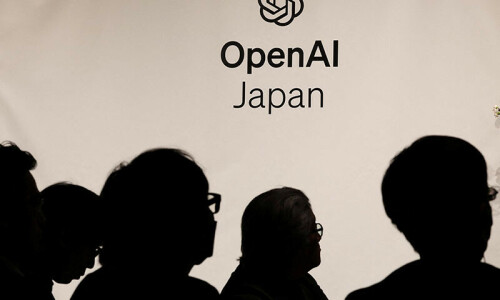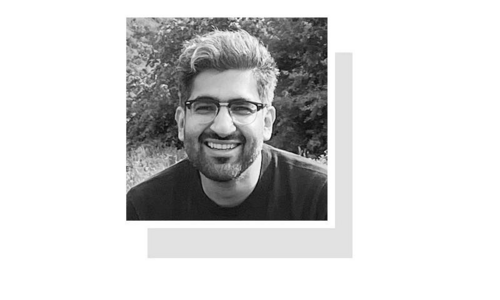Aziz Hamid Madani, a superb poet of our times who deserves a high station in the Urdu literary landscape, once spoke hauntingly of the “wound of manifestation” (zakhm-e namud). Remaining within the metaphorical realm of the classical ghazal, he invoked the imagery of a musk deer — that graceful animal which, in an intimate companionship with the breeze, runs around so freely in river valleys and forested mountains while spreading in its tracks the sweet scent of the musk gland under its navel. But then, this very self-manifestation, this very joyous pronouncement of its being, makes the deer a prey to the musk hunter —
 |
It is to the wound of its own manifestation — That the navel of the Tartar musk deer falls prey!
And in one of his glowing poems, Iqbal addresses the tulip of Sinai in the same vein, asking it the resounding question of self-manifestation: “Why did you sprout forth from the branch?” Then, recoiling the question back to himself: “Why did I break off from the branch?” The questions are answered in the fullness of poetic richness — one is, Iqbal says, the inner longing for manifestation, manifestation of being; the other, the joy of individuation, individuation in existence:
 |
But longing for self-realisation in being, and the joy of finding oneself in existence, these constitute a phenomenon that has its serious risks, cosmic as well as existential. And this is what both Madani Sahib and Iqbal are telling us.
But let us descend from the high plane of metaphysics, abstract as it is, and talk about the existential — about real life, and about its cultural and historical location, its ups and downs, its career in serial time that we measure by the clock. My very purpose here, when we are just hours away from Iqbal’s 76th death anniversary, is to highlight some less discussed aspects of our great poet’s personal life. Will it help explain or understand Iqbal’s poetry? I am not so sure. Seeking in poetry reflections of the poet’s real life experiences is usually a futile exercise, as if there exists a one-to-one direct and linear correspondence between the two. At worst, postulating such a non-complex parallelism turns out to be offensively misleading. On the other hand, reconstructing Iqbal’s personal history will certainly tell us a great deal about the inner vicissitudes and private psychology of a monumental figure of literary history.
Yes, we do have a right to know Iqbal as a person in flesh, like all of us, with our existential challenges, our likes and dislikes, and our fears and hopes. It’ll pay to humanise Iqbal. Iqbal’s interest in rearing pigeons, flying kites, his wish to make his beloved son Javid Iqbal a good wrestler as well as a Quran reciter and a fiery orator, and his habit of chanting his own poetry — these are all humanising facts of his biography. And so is the historical fact that in 1901, like many ambitious young men of his times, Iqbal tried to enter the civil service of Punjab; his ambition was to reach the coveted rank of Extra Assistant Commissioner (EAC). EAC? Indeed, we may with hindsight consider it a blessing of monumental proportions that this ambition was frustrated: the applicant was discarded on medical grounds. This biographical accident became the agency which made the world all the richer, for it gave us a poet, unique and forever enduring — now that much time was freed up that would otherwise have been spent in endless and messy administrative machinations that were the fate of an EAC. So here we have another decisive contingency of a human life.
We note that Iqbal received a good deal of recognition during his own lifetime — people eager to read and listen to his poetry, writing about it, demanding more and more of it, singing it, emulating it here, criticising it there; then, his access to princely courts; the respect he commanded among all prominent intellectual and political leaders of India; his elevated stature in the eyes of the Raj officials; and, to top it all, the honour he formally received by the bestowal of knighthood from the imperial British government. Thus, it seems that he was a successful individual in worldly terms, and we reasonably surmise that he must have been a content and happy individual. And yet, this chamber of contingent existence often darkened for him: Iqbal even contemplated killing himself. Here we see the flame of existence, like that of the musk deer, hastening towards its own extinguishing, but now with moral and intellectual control: “As a human being, I have a right to happiness; if society or nature deny that to me, I defy both. The only cure is that I should leave this wretched country for ever, or take refuge in liquor, which makes suicide easier. These dead barren leaves of books cannot yield happiness; I have got sufficient fire in my soul to burn them up and all social conventions as well …”
This sounds like the voice of a badly injured soul. But note that double-edged defiance here, defiance not only of social conventions and received knowledge, but also of nature. This excerpt comes from a letter Iqbal wrote to Atiya Fyzee in 1909; he would have been around 32, reckoned by his year of birth 1877, now established by Dr Javid Iqbal.
Why did Iqbal feel such anguish? Was he, when viewed in the totality of his existential being, a tormented individual? All this requires further enquiry. To be sure, Atiya Fyzee called his life “a cruel tragedy”. Begum Atiya Fyzee, that lady of princely background, having been born in Istanbul, begotten by a father of the rich Tyabji merchant family of Bombay (now Mumbai) who was in the service of the Ottoman court. This charming lady was one of the first women to be sent to Europe for education and it is here that Iqbal befriended her. While there seems to be an unmistakable romantic side to this friendship, Iqbal never expressly proposed a desire to hold her in wedlock. There exists a poem titled ‘Visal’ (Union) in the Bang-e Dara, which Iqbal had sent to the lady from Europe; the poem has an effulgence of delicate romance.
In fact, it might not be an excessive speculation that nobody knew better than the Begum Sahib about Iqbal’s personal turmoil and all those deeply personal challenges he faced. She still remains one of our richest and most reliable sources for the restitution of the poet’s private life. In her Iqbal found a true companion with whom he could have conversations, and discuss literature, art, poetry, and music. She was a woman of charm, dignity, and poise — and quite naturally, as a human being, Iqbal fell for it. Recall the cruel fact that the poet was married at a tender age of 15 to Karim Bibi, the daughter of an affluent physician of Gujrat. Already at the age of 18, Iqbal had his first child with her; and then, at 21, the second. All this was much before he met Atiya Fyzee.
Eventually, Iqbal’s domestic life became unbearable for him, especially following his return from Europe in 1908 after he had opened his heart to Atiya Fyzee. The most remarkable thing that we find both in Iqbal and in the elegant lady is that they rebel against parental pressures and coercion — something that still lingers in Pakistani society, working much destruction of human talent like a scythe in its ruthless movement. Throughout his life, Iqbal resented the fact that despite his refusal he was forced by his father into marriage. “My life is extremely miserable,” he wrote to Atiya Fyzee in 1909: “[T]hey forced my wife upon me. I have written to my father that he had no right to arrange my marriage, especially when I had refused to enter into any alliance of that sort.”
Individual freedom seems to have been the strong principle, imbibed from Europe, that was held tenaciously by both, Iqbal and his lady friend. Atiya Fyzee wrote categorically that Iqbal, once he returned to India, had wilted. And in the same breath she speaks of the larger losses wrought by family pressures. Here in Muslim India, she wrote around 1947, “An individual is obliged to bow before the wishes and orders of his family. In view of this, many men and women, though endowed with extraordinary intellectual brilliance, ruined their lives. Iqbal’s life was indeed a cruel tragedy which developed as a result of his family’s intransigence.
Iqbal was not in India what he was in Europe … In India his genius was corroded, and with the passage of time this overwhelmed his consciousness…”
But this is only a tiny part of an unfinished biography.
April 21 is Iqbal’s death anniversary. All Iqbal and Fyzee prose citations are to be found in Hafeez Malik. Iqbal: Poet-Philosopher of Pakistan. New York: Columbia University Press, 1971.











































